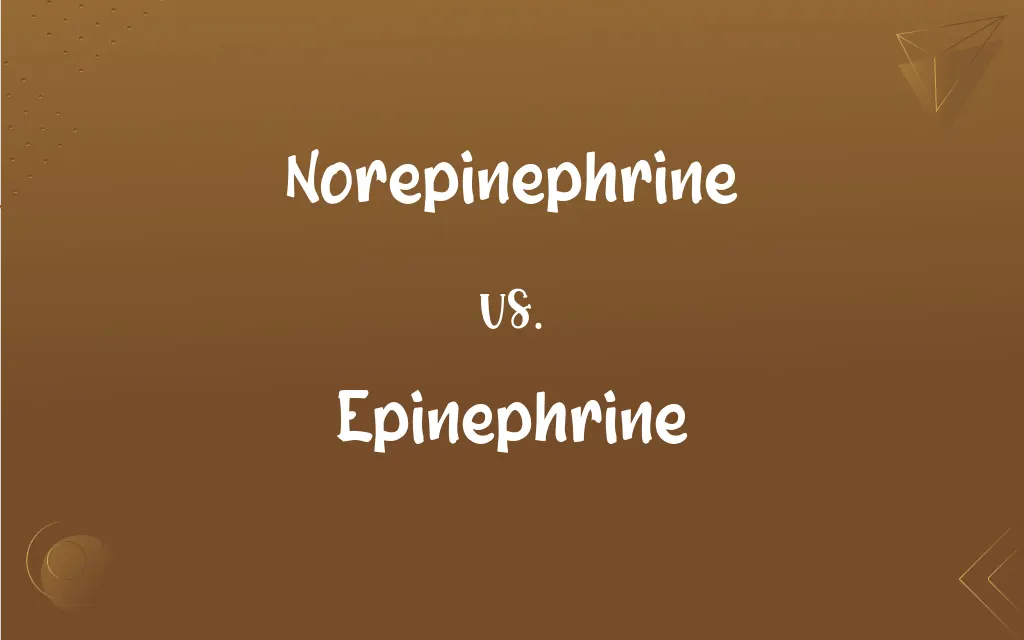Norepinephrine vs. Epinephrine: What's the Difference?
Edited by Aimie Carlson || By Harlon Moss || Published on August 25, 2024
Norepinephrine primarily functions as a neurotransmitter in the brain and sympathetic nervous system, whereas epinephrine, also known as adrenaline, acts more broadly as a hormone and neurotransmitter, triggering the body's fight-or-flight response.

Key Differences
Norepinephrine and epinephrine are both crucial chemicals in the body, playing vital roles in the nervous system. Norepinephrine primarily acts as a neurotransmitter in the brain and sympathetic nervous system, modulating stress responses and mood. Epinephrine, also known as adrenaline, serves more as a hormone released by the adrenal glands, intensifying the body's fight-or-flight response, increasing heart rate, and boosting energy.
In terms of their chemical structure, norepinephrine and epinephrine are similar, yet distinct. Norepinephrine's structure allows it to primarily influence blood pressure and mental alertness. On the other hand, epinephrine has a slightly different molecular build, enabling it to have a more systemic effect, including increasing blood flow to muscles, dilating air passages, and enhancing the body's ability to utilize oxygen.
When examining the production sites, norepinephrine is mainly produced in the brain and sympathetic nervous system. In contrast, epinephrine is predominantly produced in the adrenal glands, situated above the kidneys. This difference in production sites reflects their diverse roles and effects on the body.
In clinical applications, norepinephrine and epinephrine are used differently. Norepinephrine is often used in treating conditions like hypotension and certain types of depression, owing to its vasoconstrictive properties and impact on mood regulation. Epinephrine, in contrast, is commonly used in emergency situations like anaphylactic shock, cardiac arrest, and severe asthma attacks, given its ability to rapidly stimulate heart rate and open airways.
Despite their differences, both norepinephrine and epinephrine play pivotal roles in stress response. Norepinephrine's role is more focused on maintaining alertness and increasing focus during stressful situations, whereas epinephrine mobilizes the body for immediate physical action, preparing it for quick responses in emergency scenarios.
ADVERTISEMENT
Comparison Chart
Primary Function
Acts as a neurotransmitter in the brain and nervous system
Functions as a hormone and neurotransmitter
Role in Fight-or-Flight
Modulates stress responses
Triggers physical fight-or-flight response
Production Site
Brain and sympathetic nervous system
Adrenal glands
Clinical Use
Used to treat hypotension and certain depressions
Used in emergencies like anaphylactic shock, cardiac arrest
Effect on Blood Pressure
Primarily increases blood pressure
Increases heart rate and muscle blood flow
ADVERTISEMENT
Norepinephrine and Epinephrine Definitions
Norepinephrine
Norepinephrine is a neurotransmitter involved in concentration and alertness.
The increase in norepinephrine helped her focus during the exam.
Epinephrine
Epinephrine, also known as adrenaline, triggers the body's fight-or-flight response.
His epinephrine levels spiked when he heard the alarm.
Norepinephrine
It acts as a stress hormone, modulating the body's stress response.
His body's norepinephrine levels rose during the intense meeting.
Epinephrine
It increases heart rate and muscle readiness for rapid action.
The athlete's epinephrine surge helped him sprint faster.
Norepinephrine
It plays a role in the fight-or-flight response, albeit less so than epinephrine.
Her norepinephrine levels surged, making her more alert to danger.
Epinephrine
Epinephrine is used medically in emergency situations like anaphylaxis.
The epinephrine injection rapidly countered the allergic reaction.
Norepinephrine
In the brain, it influences mood and arousal.
Antidepressants often target norepinephrine to elevate mood.
Epinephrine
It dilates airways, improving oxygen intake during stress.
Epinephrine helped her breathe easier during the asthma attack.
Norepinephrine
Norepinephrine regulates blood pressure by constricting blood vessels.
The doctor explained how norepinephrine affects blood pressure control.
Epinephrine
As a hormone, it rapidly mobilizes energy by increasing blood sugar.
Epinephrine caused a surge in his blood glucose during the crisis.
Norepinephrine
A substance, C8H11NO3, both a hormone and neurotransmitter, that is secreted by the adrenal medulla and the nerve endings of the sympathetic nervous system and causes vasoconstriction and increases in heart rate, blood pressure, and the sugar level of the blood. Also called noradrenaline.
Epinephrine
A hormone secreted by the adrenal medulla that is released into the bloodstream in response to physical or mental stress, as from fear or injury. It initiates many bodily responses, including the stimulation of heart action and an increase in blood pressure, metabolic rate, and blood glucose concentration. Also called adrenaline.
Norepinephrine
(neurotransmitter) A neurotransmitter found in the locus coeruleus which is synthesized from dopamine.
Epinephrine
A white to brownish crystalline compound, C9H13NO3, isolated from the adrenal glands of certain mammals or synthesized and used in medicine as a heart stimulant, vasoconstrictor, and bronchial relaxant.
Norepinephrine
A hormone (C8H11NO3) secreted by the adrenal medulla; it also serves as a neurotransmitter, released at synapses; called also noradrenaline. Chemically it is 2-amino-1-(3,4-dihydroxyphenyl)ethanol. It is a precursor of epinephrine in the body.
Epinephrine
(medicine) A catecholamine hormone and neurotransmitter; as a hormone, secreted by the adrenal gland in response to stress (when it stimulates the autonomic nervous system); as a neurotransmitter, synthesized from norepinephrine. It is also used as a medication.
Norepinephrine
A catecholamine precursor of epinephrine that is secreted by the adrenal medulla and also released at synapses
Epinephrine
A catecholamine secreted by the adrenal medulla in response to stress (trade name Adrenalin); stimulates autonomic nerve action
FAQs
What is norepinephrine?
A neurotransmitter that plays a role in attention, stress response, and blood pressure regulation.
How does norepinephrine influence blood pressure?
It increases blood pressure by constricting blood vessels.
Can norepinephrine be used as a drug?
Yes, it's used in treating conditions like hypotension.
Can stress affect norepinephrine levels?
Yes, stress can increase its production.
How do norepinephrine and epinephrine differ in function?
Norepinephrine mainly acts in the brain and nervous system, while epinephrine acts more broadly as a hormone.
Where is epinephrine produced?
In the adrenal glands.
What is epinephrine?
A hormone and neurotransmitter, also known as adrenaline, that initiates the fight-or-flight response.
Where is norepinephrine produced?
In the brain and sympathetic nervous system.
What triggers the release of epinephrine?
Stress, fear, or a threat can trigger its release.
Is epinephrine the same as adrenaline?
Yes, they are two names for the same chemical.
How does norepinephrine differ from other neurotransmitters?
It uniquely influences both mental alertness and blood vessel constriction.
Does norepinephrine play a role in the fight-or-flight response?
Yes, but to a lesser extent than epinephrine.
What happens during an epinephrine surge?
Increased heart rate, energy boost, and enhanced alertness.
How does epinephrine impact blood sugar?
It raises blood sugar levels by stimulating glucose release.
Are there side effects to epinephrine injections?
Possible side effects include palpitations, trembling, and anxiety.
Can norepinephrine affect mood?
Yes, it plays a role in mood regulation and is targeted by some antidepressants.
Is epinephrine used in emergency medicine?
Yes, particularly in cases of anaphylaxis and cardiac arrest.
How does epinephrine affect breathing?
It dilates airways, making breathing easier during stress.
Does norepinephrine affect attention?
Yes, it's crucial for concentration and alertness.
Can epinephrine be artificially synthesized?
Yes, synthetic epinephrine is used in medical treatments.
About Author
Written by
Harlon MossHarlon is a seasoned quality moderator and accomplished content writer for Difference Wiki. An alumnus of the prestigious University of California, he earned his degree in Computer Science. Leveraging his academic background, Harlon brings a meticulous and informed perspective to his work, ensuring content accuracy and excellence.
Edited by
Aimie CarlsonAimie Carlson, holding a master's degree in English literature, is a fervent English language enthusiast. She lends her writing talents to Difference Wiki, a prominent website that specializes in comparisons, offering readers insightful analyses that both captivate and inform.





































































